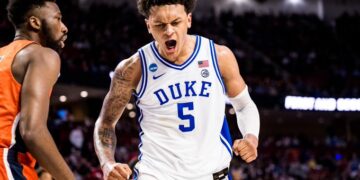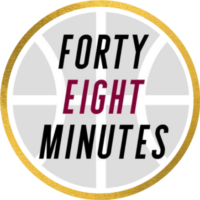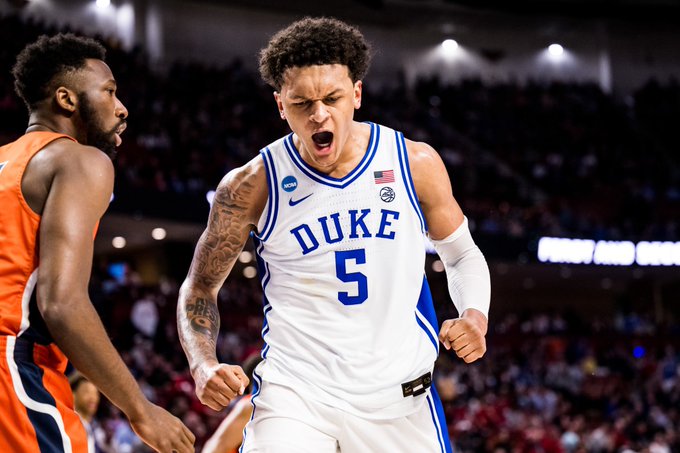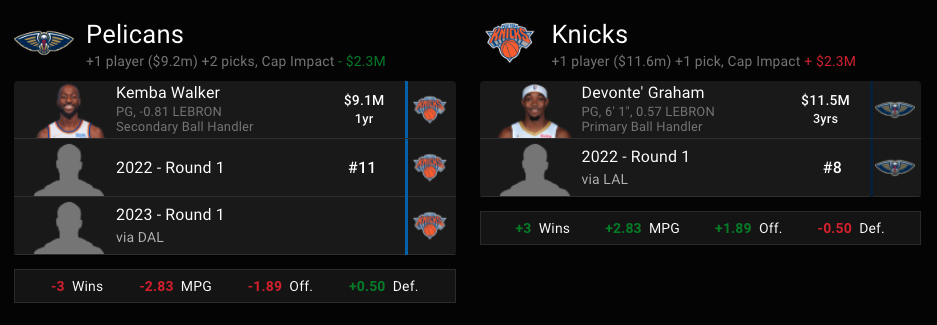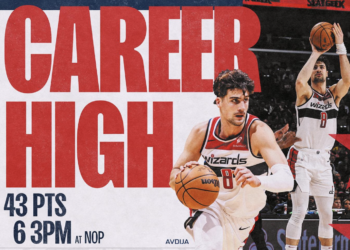“There is no such thing as a new idea. It is impossible. We simply take a lot of old ideas and put them into a sort of mental kaleidoscope. We give them a turn and they make new and curious combinations. We keep on turning and making new combinations indefinitely; but they are the same old pieces of colored glass that have been in use through all the ages.”
George Lucas has been open about Star Wars’ Japanese-inspired roots; some of Kanye West’s best early work featured samples of Luther Vandross, Otis Redding, and Michael Jackson; you’ll find the late Paul Zimmerman’s influence sprinkled throughout modern-day NFL writing just as Bill Parcells’ coaching principles remain instilled in leaders throughout the league. Whether it’s a creative idea, an innovative playbook, or nearly anything else, it’s rare that an idea is entirely new.
This brings me to Bill Barnwell. The ESPN scribe produces inspiring work that routinely delivers an in-depth, context-based analytical perspective on the NFL at large. One of my personal favorites is his annual All-Trade NFL Mock Draft, and over the past few years, I’ve wondered why there hasn’t been an NBA version of it. Perhaps it was a result of others not wanting to take Barnwell’s idea or maybe it was that smarter basketball writers and analysts figured it was a lengthy venture and writing 6500+ words on logical trades wasn’t their cup of tea. Either way, here we are.
As I stand on Barnwell’s shoulders, a giant to me, please enjoy our 2022 All-Trade NBA Mock Draft:
Note: All 30 of these trades take place in 30 separate universes, meaning you may see players/picks traded in multiple deals. The idea is to get 30 individual trades that may not be likely but each has logical reasoning as to why both sides would consider based on perceived market value and where each franchise is in its roster-building lifecycle.
Also note: All sign-and-trades, from an execution standpoint, could not occur until after free agency begins in early July. For the sake of these trades, teams would select the prospect and hold off on signing them to a rookie contract, allowing the other team to acquire the rookie’s rights at that time.
No. 1 – Orlando Magic
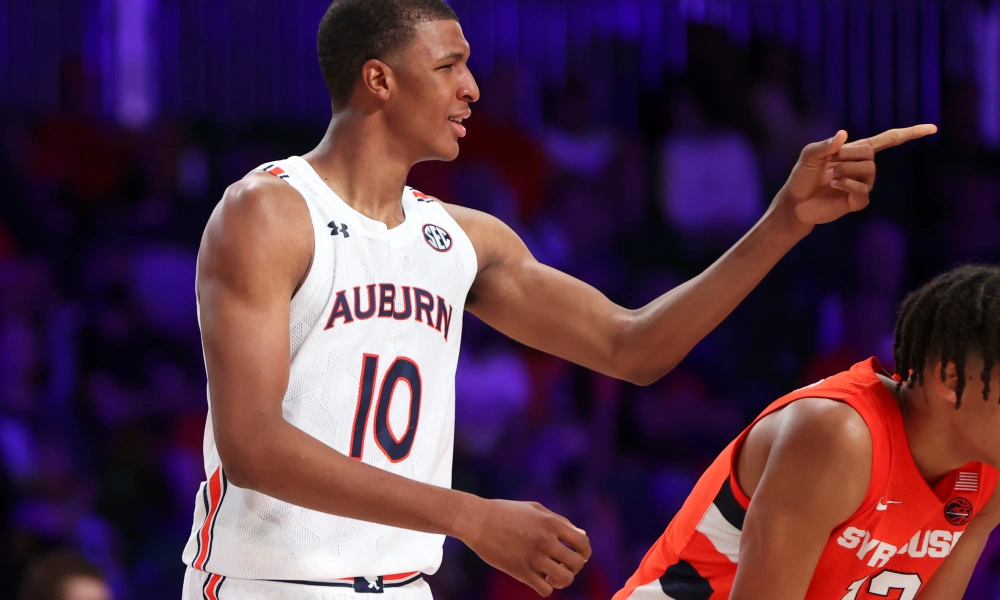
- Magic get: Zion Williamson, No. 8
- Pelicans get: No. 1, Jonathan Isaac.
As we mentioned in our previous mock draft, the Pelicans are in an interesting position with Zion Williamson, who will be eligible for an extension this summer. It’s not clear if he’s a great fit next to Brandon Ingram and his real interest in being with the Pelicans franchise is even more unclear.
It’s hard to envision Orlando trading the No. 1 selection but no doubt, teams will be calling. Is there a reasonable offer out there that would be more enticing than the Pelicans should they look to trade Williamson? When Zion is on the court, there’s no doubting his ability. He’d even-further fast-track the Magic rebuild and provide them with the type of ceiling that rivals any player in this draft class. The move would come with massive risk but it would be something worth considering for Orlando, especially if they could also add Shaedon Sharpe at No. 8.
New Orleans would make the move to take Jabari Smith Jr. and it would change their salary cap dynamic without taking away the team’s long-term ceiling. Such a trade would provide a situation similar to an NFL team with a prospering QB under a rookie contract, as David Griffin would have ultimate flexibility to bring in talent around a budding star who can play right away. It would be the kind of move that could potentially set up the Pelicans to grow into a Spurs-style dynasty rather than having that being at the mercy of Williamson’s health and interest in coming to work.
No. 2 – Oklahoma City Thunder
- Thunder get: No. 1
- Magic get: No. 2, No. 34
After the years of accumulating assets, finding an alternate universe where the Thunder move this pick is a difficult task. Would they think about Zion? Is there another star out there (our trade at No. 3 could be a possibility) that would make sense? Could they move down and acquire even more picks?
My intuition tells me that they are targeting Paolo Banchero, though if the Thunder were completely sold on either Jabari Smith Jr. or Chet Holmgren and wanted to secure their guy, this would be a move that grants OKC certainty for a relatively low price.
For Orlando, it gives them one of the perceived top-2 prospects and adds another contributor at No. 34 (Michigan State’s Max Christie would certainly be welcomed on the wing).
No. 3 – Houston Rockets
- Rockets get: Pascal Siakam, No. 20
- Raptors get: No. 3, Eric Gordon, David Nwaba
- Spurs get: Christian Wood
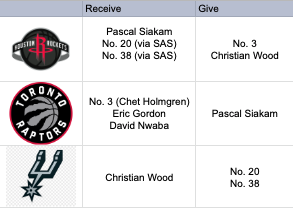 Why the Rockets say yes: Houston is rumored to be open to trading the No. 3 selection in the right deal and if the franchise wants to catapult itself back into contention, there might not be a better feasible option than trading for Pascal Siakam. Chatter about Zach LaVine, Donovan Mitchell, and Deandre Ayton switching teams this summer may dominate headlines this summer, though none raise a team’s ceiling quite like Siakam, who was reportedly on the trading block last summer. He earned All-NBA Third Team honors this past season, finishing top-20 in win shares despite missing time to begin the year (Siakam’s 8.1 WS in 2021-22 is higher than any mark that any of the aforementioned players have ever put up in a season—and it’s only the second-best season that Siakam has had in that category). The Jalen Green–Pascal Siakam pairing would be an intriguing duo for Houston to build a playoff team around and if the team can land Wake Forest forward Jake Laravia at No. 20, it would be an even better outcome.
Why the Rockets say yes: Houston is rumored to be open to trading the No. 3 selection in the right deal and if the franchise wants to catapult itself back into contention, there might not be a better feasible option than trading for Pascal Siakam. Chatter about Zach LaVine, Donovan Mitchell, and Deandre Ayton switching teams this summer may dominate headlines this summer, though none raise a team’s ceiling quite like Siakam, who was reportedly on the trading block last summer. He earned All-NBA Third Team honors this past season, finishing top-20 in win shares despite missing time to begin the year (Siakam’s 8.1 WS in 2021-22 is higher than any mark that any of the aforementioned players have ever put up in a season—and it’s only the second-best season that Siakam has had in that category). The Jalen Green–Pascal Siakam pairing would be an intriguing duo for Houston to build a playoff team around and if the team can land Wake Forest forward Jake Laravia at No. 20, it would be an even better outcome.
Why the Raptors say yes: The ‘Tampa tank’ yielded Toronto Scottie Barnes and after seeing last year’s No. 4 pick flourish, Masai Ujiri is searching to further optimize the team around the Rookie of the Year. If he feels Chet Holmgren is that guy (and Holmgren falls to No. 3, which is rumored to be a possibility), making this kind of move gives the franchise a high-ceiling, long-term running mate for last year’s No. 4 pick. It’s an unlikely scenario but if the Raptors wanted to trade Siakam, it’s a fit that makes sense for both sides.
Why the Spurs say yes: San Antonio is armed with three first-round picks and the chance to land Christian Wood for the No. 20 and No. 38 selections is too good to pass up on. San Antonio would still have the No. 9 and No. 25 overall picks to either add rookies with upside or make further trades.
No. 4 – Sacramento Kings
- Kings get: No. 10, Kyle Kuzma, Deni Avdija
- Wizards get: No. 4, Justin Holiday

Why the Kings say yes: The Kings are rumored to be willing to move the No. 4 pick in exchange for veteran help and they’ve previously been linked to Kuzma, having attempted to trade for him last summer. Kuzma moves the needle for Sacramento and Deni Avdija is arguably closer to contributing to a playoff team than nearly anyone in the draft. The deal moves the Kings closer to its goals of making the postseason for the first time since 2006 (and they could add further veteran talent by flipping the No. 10 selection, which is used to select Bennedict Mathurin in this scenario).
Why the Wizards say yes: Moving up to draft Jaden Ivey provides an opportunity to pair Bradley Beal, Kristaps Porzingis, and Rui Hachimura with another young franchise pillar who has perennial All-Star potential. Some may look at the Ivey-Beal pairing as an awkward fit but the Wizards have found success with Beal running the point previously and going dual point-shooting guards gives Washington a unique look that could quickly become a competitive advantage. Giving up Avdija so early in his career hurts but getting back Justin Holiday, who should immediately contribute to the rotation, helps soften the blow.
No. 5 – Detroit Pistons
- Pistons get: Derrick Favors, No. 12, No. 34, 2023 First-Rounder (their own back), 2023 First-Rounder (via Clippers).
- Thunder get: No. 5
Oklahoma City owns Detroit’s 2023 pick (top-18 protected) via their Alperen Sengun trade with Houston during last year’s draft (the Rockets owned the pick as part of the previous Christian Wood/Isaiah Stewart trade). The Pistons are likely to keep that selection in 2023 due to the protections but it becomes slightly less protected as the years pass before turning into a 2027 second-round if it never conveys.
In this trade, the Pistons take any doubt away from losing their future pick and they add another first-round pick in this year’s draft as well. Detroit also nets a 2023 selection via the Clippers and Derrick Favors, who recently opted into his $10.1 million player option. At No. 12, they land Mark Williams out of Duke, who has a chance to be the team’s defensive anchor for years to come.
For the Thunder, they take a page from their own book, drafting two top-5 players in a year where they land a top-2 pick. In 2007, the organization (still in Seattle) landed the No. 2 selection and opted to trade Ray Allen for the No. 5 pick. Kevin Durant and Jeff Green were the beginning building blocks of their rebuild and in this scenario, the Thunder add two top-5 picks to end a draft pick hoarding phase of their current rebuild. The core of Josh Giddey, Shai Gilgeous-Alexander, Chet Holmgren, and AJ Griffin could follow a similar path to the previous generation of young talent in OKC (plus they have the cap space to further build around them).
No. 6 – Indiana Pacers
- Pacers get: No. 21, Michael Porter Jr.
- Nuggets get: No. 6, Buddy Hield

It’s rare that we see a player traded with five years remaining on his contract, though MPJ isn’t your typical case. When he’s on the court, he’s a ceiling raiser, one that brings the Nuggets close to contention.
Yet, the Nuggets are in an interesting spot. The franchise is teetering over the luxury tax with their foursome of Nikola Jokic, Jamal Murray, Michael Porter Jr., and Aaron Gordon combining for nearly $115 million on the books next season. Jokic is in line for a new extension this summer and the annual values of each of the other three contracts will rise year to year over the next few seasons. For a team that has advanced in just 50% of its playoff series in the Jokic-era, it’s hard to envision the team not moving at least one member of this core sooner than later.
All signs point to Denver giving this core the chance this upcoming season but considering this type of trade now would be both forward-thinking and conducted from a position of strength (reducing team cost before rival teams circle the franchise knowing they have to make a move).
The Nuggets would target Keegan Murray, who is considered one of the more pro-ready prospects in this draft, as someone who can contribute immediately on a team-friendly rookie deal and allow the franchise to better optimize the talent around Jokic. It’s a strategy that should help Denver extend the big man’s prime (not too dissimilar to what Golden State has with Jonathan Kuminga and how his rookie salary allows the club to spend elsewhere).
The franchise would take a slight step back from an on-the-court ceiling perspective and having two Murrays in Denver would certainly cause fans and broadcasters some confusion at first. Yet, it’s the kind of move that shifts Denver’s roster away from being so top-heavy and reduces long-term risk while also allowing for some long-term ceiling-raising possibilities (such as acquiring Buddy Hield-level role players and eventually moving Aaron Gordon for a mega-contributor on the perimeter).
MPJ’s contract brings risk but for the Pacers, the small forward also brings immediate All-Star potential and someone who would be a tremendous fit alongside the budding backcourt of Tyrese Haliburton and Chris Duarte. Indiana would be ready to compete for a playoff spot now while also having a core cracks open the window to title contention in the near future (note: the trade would have to take place after June 29—six days after the draft) so that Porter’s Poison Pill Provision expires—meaning that the Pacers would have to draft for the Nuggets and vice versa before making the deal official).
No. 7 – Portland Trail Blazers
- Blazers get: Zach LaVine (sign-and-trade), No. 18
- Bulls get: No. 7, Eric Bledsoe, Joe Ingles (sign-and-trade)
The Blazers could carve out enough cap space to make a max offer to LaVine (which would be roughly four-year, $160M), though it would hinder their ability to make other moves. Creating a sign-and-trade would allow the team to operate as a team above the cap, something longtime NBA capologist Eric Pincus recently outlined as a desirable option.
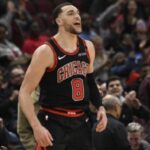
Operating as a team over the cap would allow the team to retain the Bird rights of Anfernee Simons, and Jusuf Nurkic (in addition to Ingles, who would be signed-and-traded to Chicago in this scenario). Using the route to acquire LaVine would also allow Portland to keep its three trade exceptions totaling $30.6 million and give the team a path to the larger mid-level exception.
As a team over the cap, the Blazers would have the full non-taxpayer mid-level exception (~$10.3 million starting, four years max) or the smaller taxpayer mid-level (~$6.3 million starting, three years max) depending on the team’s total salary. The former would only be available if Portland keeps its total payroll below the projected $153.6 million apron. If so, it would also have the bi-annual exception (~$4.0 million starting, two years max).
Portland could then add multiple pieces, perhaps even flipping who they select at No. 18 to bring in another high-level veteran (Jerami Grant, who played alongside LaVine and Damian Lillard during Team USA’s most recent Gold Medal run, comes to mind).
For Chicago, it’s about recouping assets for losing a star. The team could target Dyson Daniels with the No. 7 overall pick, and Bledsoe’s contract, which only has $3.9 million of guaranteed salary on next year’s total ($19.3 million), may be able to fetch the Bulls an additional asset from a team looking to shed payroll.
No. 8 – New Orleans Pelicans
- Pelicans get: Kemba Walker, No. 11, 2023 First-Rounder (top-10 protected via Dallas)
- Knicks get: Devonte’ Graham, No. 8
It’s not the trade with the Pelicans that New York fans might be clamoring for but it’s the feasible one they may need.
The move allows the Knicks to leapfrog the Wizards and Spurs to secure their pick of prospects from the third tier (in this mock, it’s Jalen Duren) while also bringing in another young point guard option in Graham, who never really met expectations in New Orleans.
For the Pelicans, the trade brings in a future asset to move down a few spots while also taking a chance on a rejuvenation from Kemba Walker. New Orleans would look to draft either AJ Griffin or Bennedict Mathurin at No. 11.
No. 9 – San Antonio Spurs
- Spurs get: No. 3
- Rockets get: No. 9, No. 20, 2023 First-Rounder (Top-1 protected), 2027 First-Rounder (unprotected)
San Antonio would trade up to add a franchise pillar in the frontcourt, Paolo Banchero. The Duke star would pair nicely with Dejounte Murray to give the franchise a 1-2 punch and give the franchise a clear roadmap to rejoin the elites in the Western Conference over the next few years.
For the Rockets, it would continue their rebuild, giving them three additional picks including that 2027 unprotected pick, which may be seen by other franchises as a blue-chip asset. With the No. 9, Houston locks in on Shaedon Sharpe, who falls a bit after hearing some buzz about being a potential top-5 pick.
No. 10 – Washington Wizards
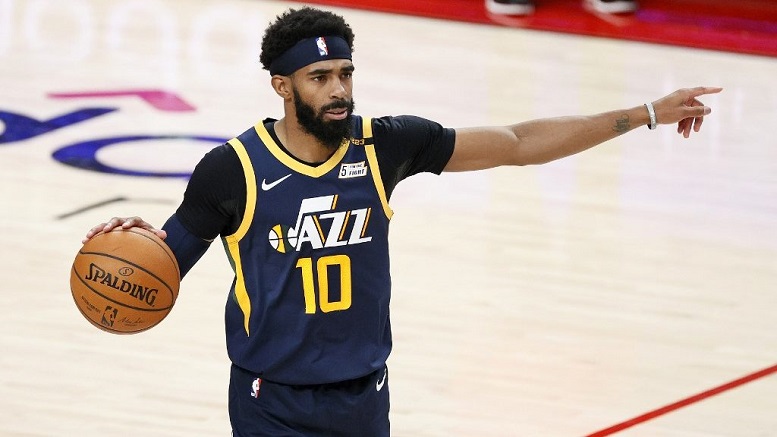
- Wizards get: Mike Conley, No. 32, 2024 First-Rounder (Top-10 protected via Orlando)
- Magic get: No. 10, Ish Smith
- Jazz get: Chuma Okeke, Kentavious Caldwell-Pope, 2023 First-Rounder (Chicago via Orlando)
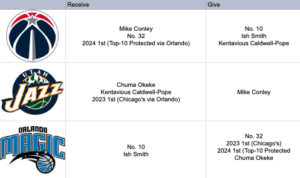 Why the Magic say yes: Landing the No. 1 pick moves Orlando forward in their rebuild and finding the right players around Jabari Smith Jr. is going to be key for the franchise. The front office moves three picks and former first-rounder Chuma Okeke in order to secure Malaki Branham, who’s been rising up draft boards since the offseason began. Note: Washington would have to make the selection and execute the trade afterward given they don’t have a 2023 selection (via Russell Westbrook trade/Stepien Rule).
Why the Magic say yes: Landing the No. 1 pick moves Orlando forward in their rebuild and finding the right players around Jabari Smith Jr. is going to be key for the franchise. The front office moves three picks and former first-rounder Chuma Okeke in order to secure Malaki Branham, who’s been rising up draft boards since the offseason began. Note: Washington would have to make the selection and execute the trade afterward given they don’t have a 2023 selection (via Russell Westbrook trade/Stepien Rule).
Why the Wizards say yes: Washington has its sights on a veteran guard and reportedly is willing to move the No. 10 pick in such a trade. This scenario brings in a package headlined by Mike Conley for Washington’s first-rounder. Washington still looks to add a prospect with the No. 32 with Duke’s Wendell Moore Jr. serving as a possibility.
Why the Jazz say yes: There’s a new era forming in Utah and the team is likely to retool its roster around Donovan Mitchell. This trade opens up a path that allows Mitchell to see more time at the point guard spot while bringing in Okeke, who could thrive with a change of scenery around more established players. Adding a 2023 first-round pick is something that will give the franchise more flexibility to make additional moves this offseason as well.
No. 11 – New York Knicks
- Knicks get: Donovan Mitchell, No. 46
- Jazz get: Kemba Walker, Evan Fournier, No. 5, (2025 First-Rounder via Detroit Top-3 protected), 2025 First-Rounder (NYK unprotected), 2028 First-rounder (NYK unprotected)
- Pistons get: RJ Barrett, No. 11
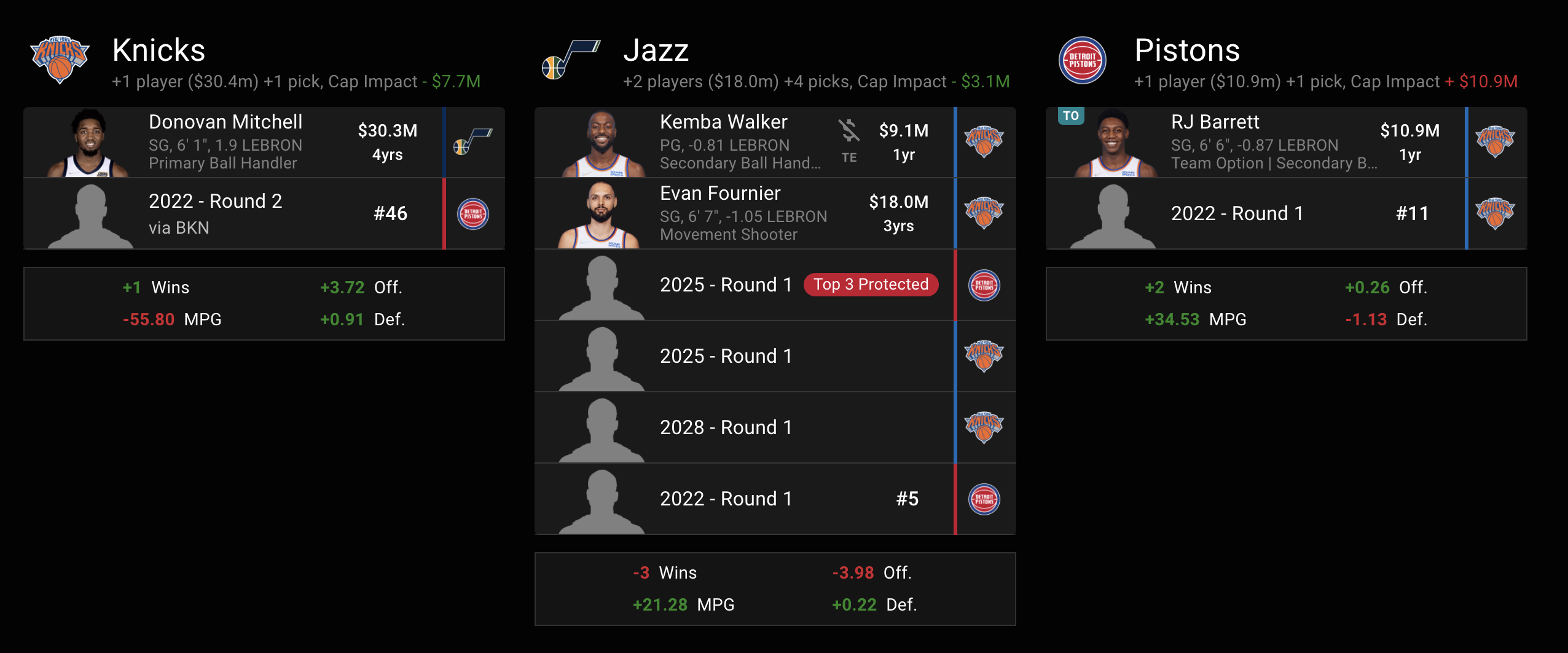
Another three-way trade. Let’s unpack it.
The Knicks get their star in Mitchell, surrendering RJ Barrett, Evan Fournier, Kemba Walker, and three first-round picks (including this year’s No. 11). Utah then flips Barrett and the No. 11 to Detroit for the No. 5 and a future protected first-rounder.
Utah’s front office would target Jaden Ivey with the No. 5 pick, retooling around the Purdue product and their cast of reliable veterans. The Jazz would take a step back but they’d be stocked with draft assets to slowly transition into the next phase for the franchise.
For Detroit, the trade speeds up its timeline to compete by pairing Barrett with Cade Cunningham at a cost of sliding down six spots in this year’s draft while also giving up a future first-rounder (2025, top-3 protected). The Pistons also give themselves a good shot at landing a presumed top-10 pick who falls on draft night with Ousmane Dieng, Jalen Duren, and AJ Griffin among the possibilities.
No. 12 – Oklahoma City Thunder
- Grizzlies get: No. 12
- Thunder get: No. 22, 2023 First-Round Pick (top-5 protected)
The Grizzlies trade up 10 spots to select Jeremy Sochan, surrendering their first-rounder next season. The Baylor product would seamlessly fit with their core of Ja Morant, Desmond Bane, and Jaren Jackson Jr.
For OKC, they pick up value while moving down to No. 22 where they find Nikolc Jovic available.
No. 13 – Charlotte Hornets
- Hornets get: Pascal Siakam, Jordan Clarkson
- Raptors get: No. 13, Rudy Gobert
- Jazz get: No. 33, No. 45 Gordon Hayward, Miles Bridges (via sign-and-trade), Future Second-Round Pick (Hornets’ 2027)
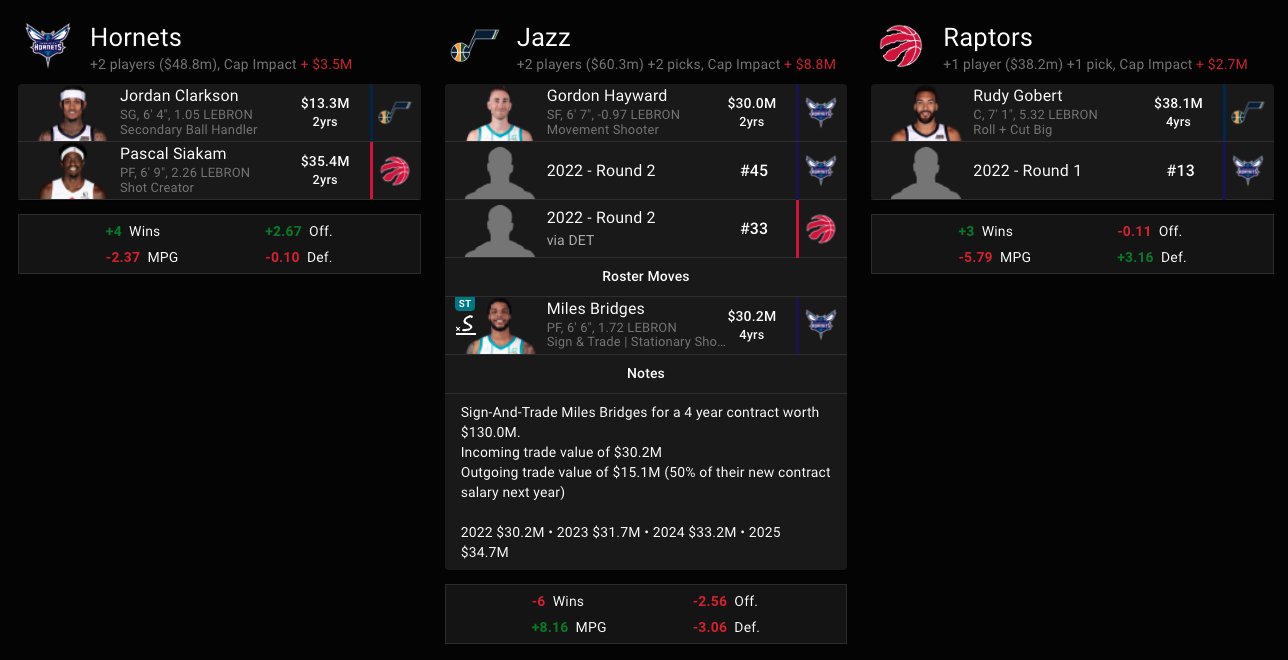
There’s been some buzz about the Hornets moving one of their first-round picks and in this scenario, they pull off a blockbuster for Pascal Siakam with the No. 13 being a key element in the deal.
Execution-wise, this deal would be performed in two separate transactions: A sign-and-trade of Miles Bridges to Utah for Jordan Clarkson and a three-team deal that sends Siakam to Charlotte, Gordon Hayward and a pair of second-round picks in this year’s draft to Utah, and Rudy Gobert along with the No. 13 overall selection.
The Raptors would use the selection on Ochai Agbaji, who should have the ability to contribute right away in Nick Nurse’s rotation due to his ability to defend and consistently make shots from the outside.
For the Jazz, the move is all about providing Donovan Mitchell with a new running mate in Bridges and it’s possible that Hayward could be shipped elsewhere (along with the No. 33 pick) by the end of draft night.
No. 14 – Cleveland Cavaliers
- Cavaliers get: No. 10, Kentavious Caldwell-Pope
- Wizards get: No. 14, Collin Sexton (via sign-and-trade)
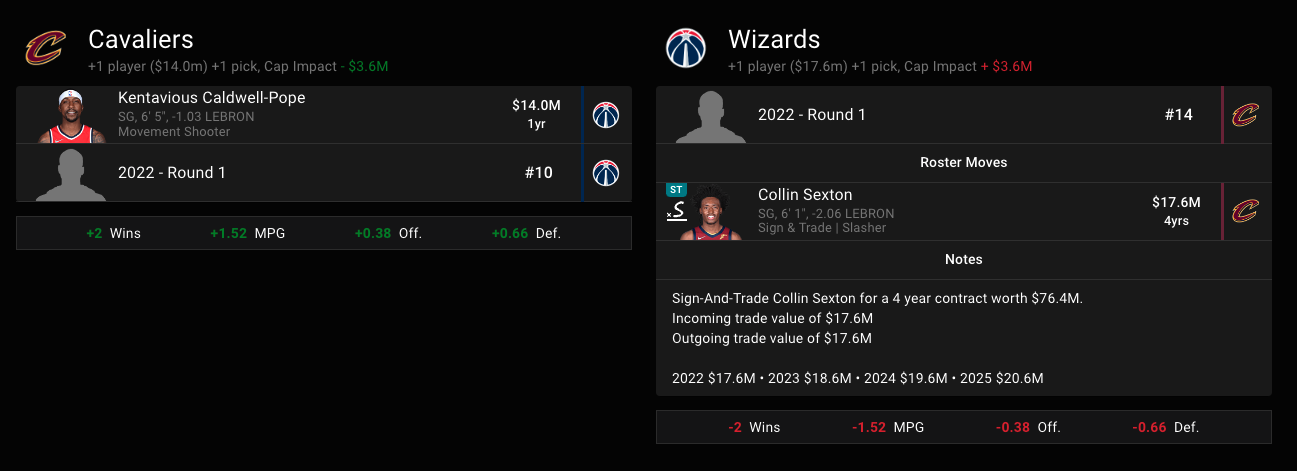
It’s looking more and more unlikely that Collin Sexton returns to the Cavaliers and while the Wizards have been linked to the former No. 8 overall pick, they don’t have the cap space to ink him to a reasonable contract. The two sides work out this agreement, which sends Sexton to Washington via sign-and-trade.
Cleveland locks in on Johnny Davis, surpassing the Knicks and other teams rumored to be in the mix for the University of Wisconsin stud. The Wizards move down four spots and take Jalen Williams, who has showcases range and play-making ability on the offense while possessing the physical tools to develop into a top option on the defensive end.
No. 15 – Charlotte Hornets
- Hornets get: No. 25, Seth Curry, Joe Harris
- Nets get: No. 20, Josh Richardson
- Spurs get: No. 15, Gordon Hayward

Why the Hornets say yes: Charlotte moves down 10 spots in the draft while picking up Curry and Harris to crystalize the team’s wing depth. At No. 25, the franchise selects Walker Kessler out of Auburn with the hopes of developing him as their future at the center position.
Why the Nets say yes: Brooklyn swapping out two rotation players for Richardson may seem like a loss but the team banks on a bounceback from the former Heat wing while drastically lowering luxury tax payment (something that allows the franchise to re-sign its pair of restricted free agents: Nic Claxton and Bruce Brown). The Nets use the No. 20 pick to select E.J. Liddell out of Ohio State, giving the club a young rookie who should be able to contribute immediately.
Why the Spurs say yes: It’s unlikely that the Spurs are going to add four rookies to their roster next season. In this scenario, the club already added Bennedict Mathurin with the No. 9 pick, and trading the No. 20 and No. 25 to move up to No. 15 allows the club to select Jeremy Sochan with their second first-rounder. Both rookies should see playing time in year one in a retooled Spurs rotation that could be much improved with Hayward and other possible veteran additions via free agency.
No. 16 – Atlanta Hawks
- Hawks get: Deandre Ayton
- Suns get: No. 16, Clint Capela
Atlanta is in the market for a second star and they might just be the best fit for Deandre Ayton, who didn’t receive a rookie-scale contract extension last summer and is now a restricted free agent. The Hawks would have to work out a sign-and-trade and if the Suns are looking to bring in another center on a more team-friendly deal, Clint Capela (who previously was Chris Paul‘s teammate in Houston) fits the bill.
Phoenix would give up some long-term upside in Ayton, though they’d look to add a potential long-term piece with the No. 16 overall selection, such as TyTy Washington or Ochai Agbaji.
No. 17 – Houston Rockets
- Rockets get: No.7, Eric Bledsoe
- Blazers get: Christian Wood, Eric Gordon, Jerami Grant, 2024 First-Rounder (Brooklyn’s via Houston)
- Pistons get: No. 17, John Wall

Why the Rockets say yes: The Rockets land Banchero at No, 3 in this scenario and aim to add his college teammate, AJ Griffin as well. Houston pays a hefty price to do so, giving up Wood and Gordon while also surrendering one of the picks they added in the James Harden trade. The team also finds a taker for John Wall and in Eric Bledsoe‘s partially guaranteed contract (only $3.9 million guaranteed), the team is able to put itself in an even more financially prudent spot while the young roster grows.
Why the Blazers say yes: Portland is looking to retool around Damian Lillard and adding the three veterans accomplishes several deliverables. Wood provides the Blazers with a dynamic big man, capable of playing both inside and outside the post. Grant adds a legit two-way presence with borderline All-Star potential and Gordon provides outside shooting and depth. It’s worth noting that Portland isn’t guaranteed to own its 2023 selection (lottery protected via the Larry Nance–Lauri Markkanen three-way trade), so Portland would have to draft a prospect at No. 17 and then execute this trade.
Why the Pistons say yes: Detroit doesn’t want to be in the shop for long as they rebuild around Cade Cunningham but adding pieces that fit his timeline is a must this offseason. In this scenario, the Pistons selected Keegan Murray at No. 5, and at No. 17, they target Jaden Hardy, who could hear his name called anywhere in the back half of the first round.
No. 18 – Chicago Bulls
- Wizards get: Coby White, No. 18, 2023 First-Rounder (lottery protected via Blazers)
- Bulls get: Deni Avdija, No. 10
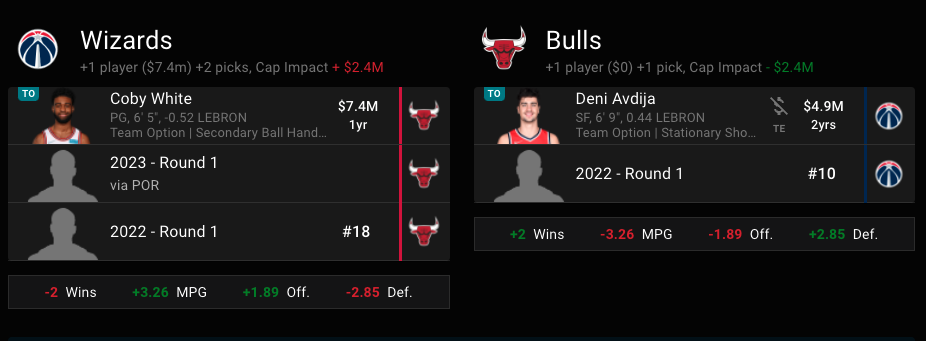
Entering the 2019 draft, many expected Coby White to be a top-5 pick and despite having the No. 9 selection, the Wizards brought the point guard in for a workout. Washington liked what they saw but White ultimately went two picks ahead (Wizards landed Rui Hachimura at No. 9).
White hasn’t blossomed in Chicago as many had hoped and he’ll head to Washington in this mock trade with a chance to turn his young career around. Tommy Sheppard & Co. also net a future first-rounder (via the Portland-Cleveland-Chicago three-way trade that sent Lauri Markkanen to the Cavs and Larry Nance Jr. to the Blazers) as part of the swap that sends out 2021 No. 9 overall pick Deni Avdija and moves the Wizards down eight spots in this year’s draft.
Chicago targets Jalen Duren, who could play alongside Nikola Vucevic in year one and eventually serve as a long-term replacement. Washington selects forward Jalen Williams with the No. 18 pick here, adding one of the more mature rookies to the program in Washington.
No. 19 – Minnesota Timberwolves
- Timberwolves get: Luke Kennard, Marcus Morris, Ivica Zubac, 2028 First-Round Pick
- Clippers get: No. 19, D’Angelo Russell

The Clippers are position to add a point guard this offseason and with the Wolves rumored to be dangling D’Angelo Russell, the franchise moves in. Los Angeles targets E.J. Liddell, who can immediately join Ty Lue’s rotation.
The Luke Kennard–Marcus Morris–Ivica Zubac trio brings added depth around Anthony Edwards and Karl-Anthony Towns in Minnesota, putting the franchise in a position to build on the success they had this past season. Picking up a future first-rounder gives the team more ammunition should they look to make a major splash down the road.
No. 20 – San Antonio Spurs
- Spurs get: Rudy Gobert
- Jazz get: No. 20, Jakob Poeltl, Keldon Johnson

The Jazz don’t have a selection in this draft but they move Rudy Gobert in this scenario to get in on the action. The franchise adds the No. 20 overall pick with retooling the roster around Donovan Mitchell in mind. Bryce McGowens (Nebraska), Jalen Williams (Santa Clara), and Blake Wesley (Notre Dame) are some possibilities for the franchise.
For the Spurs, losing Johnson and Poeltl hurts given the progress each has made while under Gregg Popovich’s tutelage. Gobert significantly raises the ceiling, however. Pairing him with Murray provides San Antonio with a path to rise up the standings in the Western Conference without mortgaging the future of the franchise.
No. 21 – Denver Nuggets
- Nuggets get: No. 27, Max Strus
- Heat get: No. 21, 2023 Second-Round Pick
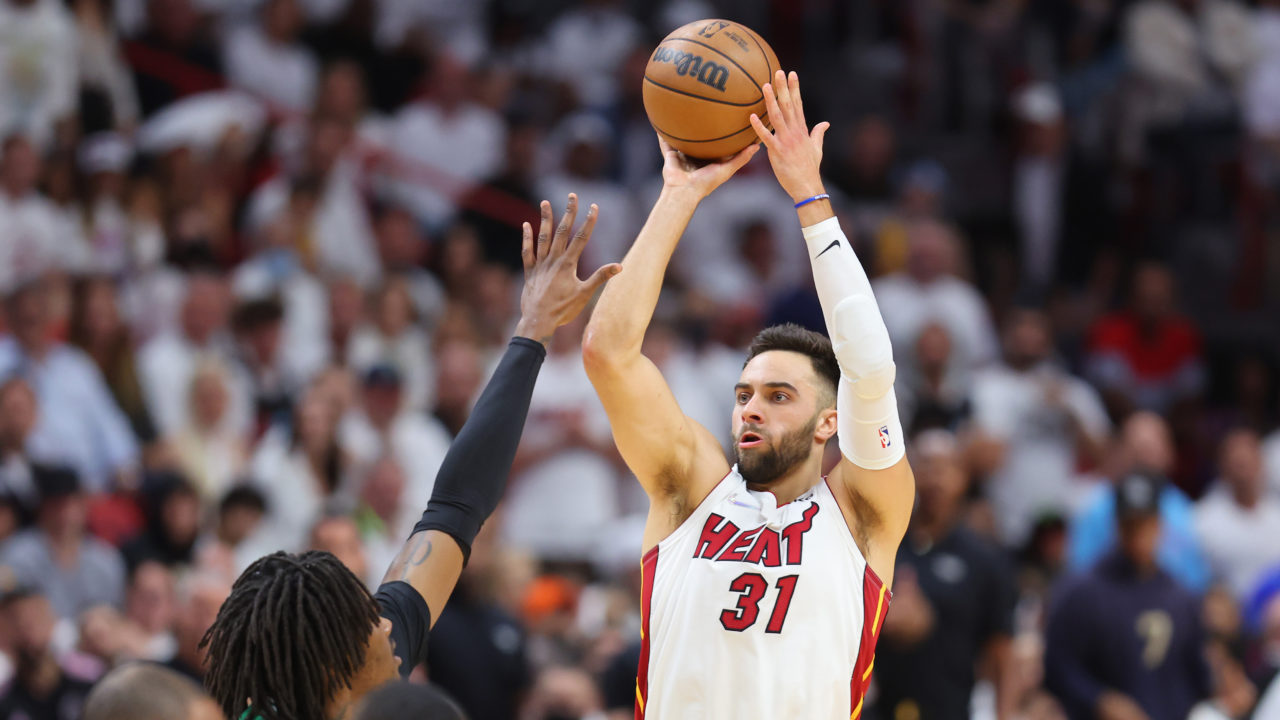
Max Strus – photo via Getty Images
Miami sends out Max Strus in order to move up six spots in the draft and select one of the most athletic talents available: Kendall Brown. The Baylor product might not be ready to contribute right now but he provides Miami with a prospect who can grow into a major role. Adding a future second-round pick doesn’t hurt either, as the franchise currently owns just a pair of second-round picks through the 2028 draft.
For the Nuggets, adding rotation players without breaking the bank will be key and Strus is making just $1.8 million during the 2022-23 season (the final year of his contract). Denver also saves on the delta between the projected rookie scale contract amount of the No. 21 pick (slotted at roughly $2.3 million) vs. the No. 27 pick (roughly $1.8 million). Every bit counts for a team that is attempting to stay below the luxury tax or wants to mitigate the cost of going over.
No. 22 – Memphis Grizzlies
- Grizzlies get: No. 13
- Hornets get: No. 22, 2023 First-Rounder (Top-5 Protected)
The Grizzlies have a history of trading up for their preference of prospect and in this scenario, it’s Ochai Agbaji out of Kansas. Many consider Agbaji pro-ready and Memphis surrenders the No. 22 selection as well as a future top-5 pick to add the two-way wing to its promising young core.
Charlotte, which doesn’t possess its own 2023 selection. (Kai Jones draft night trade), moves down and nabs Blake Wesley out of Notre Dame while picking up a future asset.
No. 23 – Philadelphia 76ers
- Sixers get: Donovan Mitchell, Royce O’Neale
- Jazz get: No. 4, No. 23, 2024 First-Round Pick (LAL Unprotected via NO), 2026 Pick Swap (76ers), Tobias Harris
- Pelicans get: Tyrese Maxey
- Kings get: No. 8, Matisse Thybulle
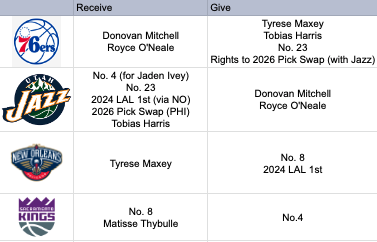
Why the Pelicans say yes: New Orleans is ready to compete now and the franchise is armed with future draft capital. Bringing in a rookie with the No. 8 pick may not be the best course of action; the rotation is already filled with young talent and adding another prospect who could take time to develop doesn’t exactly align with the franchise’s current timeline. Maxey, however, has proven that he can contribute to a competitor, flashing All-Star potential for the Sixers. It worked out for the Pelicans the last time they moved two first-rounders for a Sixers point guard and this time is no different.
Why the Jazz say yes: Reports out of Utah suggest the team has no plans to trade Donovan Mitchell, though we’ve seen the franchise make sudden star trades in the past (Deron Williams circa 2011). In this scenario, the Sixers and Jazz quietly search for a third partner to send Maxey, who is the core of Philadelphia’s trade package, finds the Pelicans willing to offer a package of picks, including the No. 8 selection. Utah has its sights on Jaden Ivey and is able to parlay Thybulle and the No. 8 pick to land the 20-year-old out of Purdue and they acquire fo Nikola Jovic (via the No. 23 pick, which Philly must make the selection and trade to Utah, as a result of the Stepien rule). After moving on from Mitchell, the Jazz are set up to remain competitive now while ushering in a new face of the franchise and collecting ammunition to make another move in the future.
Why the Kings say yes: Sacramento is rumored to be open to moving the No. 4 pick for more ready-now contributors and they’ve been linked to Thybulle in the past. The franchise agrees to move down four spots in the draft in exchange for adding Thybulle, who can immediately assist the franchise in its goal of getting back to the postseason.
Why the Sixers say yes: Maxey has blossomed over the past two years, though if Daryl Morey is going to swing a trade for another star, the point guard is really the only blue-chip asset the franchise has. And let’s be clear: Maxey’s trade value is right now super high, though there’s a possibility that it may never get any higher. He’ll be due for a rookie contract extension next summer. Maxey on a rookie deal is a home run. Maxey on a rookie-scale extension, which could be a max deal (or near it), means the task of projecting exactly what Maxey’s career arc will be even more crucial.
We’ve seen a collection of late-round point guards similarly find success with contending teams and two cases stand out as a comparison for Maxey: Rajon Rondo and Ty Lawson. Both point guards found success early in their rookie contract with Rondo contributing to the Celtics’ Big-3 championship and Lawson finding a role on 50+ win teams in Denver. Rondo would eventually become the star of the Celtics as their core aged while Lawson plateaued as an above-average starter with a couple of seasons of being an All-Star snub highlighting his resume. If the Sixers are confident that Maxey’s career arc will look more like the former than the latter, they don’t execute this deal. If they are more uncertain, they’d be wise to remain open to a Maxey trade that sees the club bring in a bonafide All-Star who fits alongside Harden and Joel Embiid. Mitchell is that guy and his arrival would immediately put the Sixers right back in the NBA title conversation.
No. 24 – Milwaukee Bucks
- Bucks get: Luguentz Dort, No. 34
- Thunder get: No. 24, 2023 Second-Round Pick, 2024 Second-Round Pick, Rayjon Tucker

Milwaukee is in an interesting position with the No. 24 pick, as we detailed in our last Mock Draft. The team is without multiple future first-round picks and as the pillars of the franchise age, it’ll become more difficult to maintain its position among the NBA’s elite teams. Many will rightfully say that the Bucks must place those concerns on the back burner as long as Giannis is in his prime.
Yet, this trade adds to the present while also taking into account the future. Dort, who will turn 24 during next year’s playoffs, should fit right in with Bucks’ defensive scheme and he provides the club with a young player who can grow into a bigger part of this team’s nucleus as the current core ages. At No. 4, Milwaukee can take a chance on adding a rookie who may be able to contribute immediately in Gonzaga’s Andrew Nembhard.
After moving to No. 2 in the lottery, the Thunder’s objectives slowly shift from purely acquiring as much talent as possible to efficiently managing which young players they are going to build around long-term. There’s no doubt that Dort could thrive with OKC’s growing young core, though he’ll hit free agency in the summer of 2023 and that could be a tricky situation to navigate. Sam Presti gets ahead of it in this deal, acquiring two future second-round picks and G-League darling Rayjon Tucker in addition to moving up ten spots in the draft. At No. 24, OKC zeros in on Nebraska’s Bryce McGowens, whose upside as a wing scorer projects to be a great interchangeable fit in the backcourt along with SGA and/or Josh Giddey.
No. 25 – San Antonio Spurs
- Spurs get: Deandre Ayton
- Suns get: No. 25, Jakob Poeltl
The Spurs are one of several teams reportedly interested in signing Ayton, though the center is a restricted free agent, which gives the Suns the ability to match any offer.
In this scenario, the Spurs and Ayton agree to a max contract and San Antonio works out a sign-and-trade, sending Jakob Poeltl and the No. 25 overall pick to Phoenix in exchange for the former No. 1 overall pick.
The Suns look at Tennessee’s Kennedy Chandler with this selection, adding long-term upside to their backcourt rotation.
No. 26 – Dallas Mavericks
- Mavericks get: Daniel Gafford
- Wizards get: No. 26
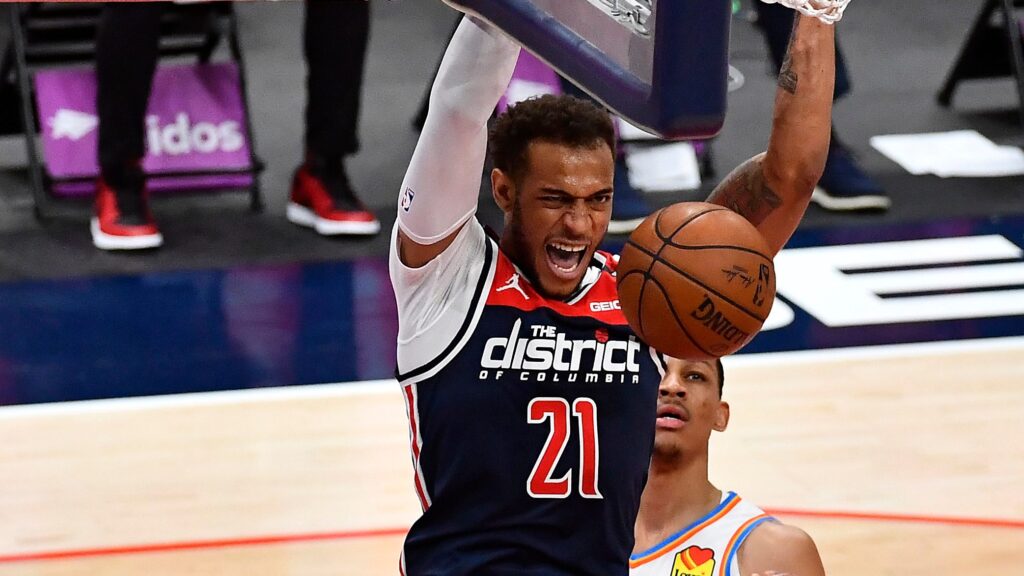
Daniel Gafford-USA TODAY Sports Images
It’s rare that teams executive back-to-back trades and it’s also rare that the organizations’ trade players so soon after signing an extension (Gafford’s three-year, $40 million extension doesn’t kick in until the 2023 offseason). Yet, in both cases, the fit makes too much sense not to buck historical trends.
Gafford would be a low-cost defensive option for the upcoming season before his contracts balloons ($1.9 million in 22/23 to $12.4 million in 23/24) and his game fits just as seamlessly with the Mavericks. In this scenario, the center becomes expendable after the club selects Jalen Duran with the No. 10 pick.
With No. 26, the Wizards would want Jaden Hardy, who had an uneven season with the G League Ignite but many NBA evaluators still project him to be a first-round talent.
Dallas would have to make the selection at No. 26 because of the Stepien Rule (Dallas didn’t have a selection last year and they don’t have a first in the 2023 NBA Draft) and the execution of the transaction would have to take place afterward.
No. 27 – Miami Heat
- Heat get: LeBron James
- Lakers get: No. 27, Ben Simmons, Duncan Robinson
- Nets get: Bam Adebayo, Talen Horton-Tucker

Rumors about LeBron James leaving the Lakers this offseason began circulating earlier in the season and reports out of Los Angeles indicated that the franchise won’t feel pressure to trade LBJ as the four-time MVP enters the final year of his contract.
It’s an interesting situation because while there’s no doubt that every team would love to add a player of James’ caliber, few NBA clubs make sense based on teams’ timelines to compete and their ability to carve out the $40+ million in outgoing contracts without completely gutting their roster of talent.
I don’t envision this trade happening, though if James decides he wants to take his talents to South Beach again (and Miami welcomes it), this scenario satisfies all parties involved.
The Nets would move Ben Simmons, who has reportedly been looking to play for a team in Los Angeles for quite some time, for a much better fit in Adebayo and add THT for additional depth.
The Lakers rarely move superstars, though they would get value back for moving one, similarly to how they added several pieces in the Shaquille O’Neal deal back in the summer of 2004.
As for the No. 27 overall pick, Los Angeles would target Christian Koloko out of Arizona to give the franchise a prospect who has the potential to be a long-term defensive anchor for the team.
No. 28 – Golden State Warriors
- Warriors get: DeMar DeRozan
- Bulls get: No. 28, Andrew Wiggins, James Wiseman
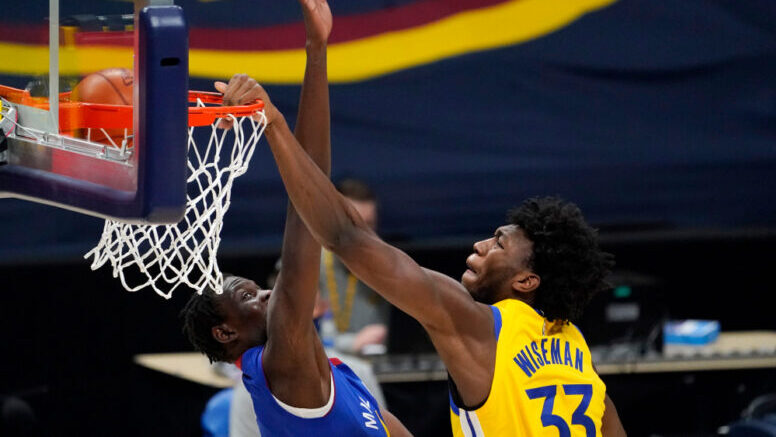
James Wiseman (AP Photo/David Zalubowski)
In this scenario, the Bulls re-sign Zach LaVine and look to retool on his timeline and Golden State pounces on the opportunity to acquire DeMar DeRozan, who played alongside Stephen Curry and Klay Thompson previously in international play.
Moving on from Andrew Wiggins hurts, given how much he has improved since arriving in Northern California, though the front office makes this move to maximize Curry’s title window (and not that it matters, but Golden State would also dramatically reduce their tax burden).
The Bulls reunite LaVine with his former teammate in Wiggins and the franchise finds a center with upside who can play alongside Nikola Vucevic now while serving as a future of the position (Chicago is rumored to be interested in Mitchell Robinson and Wiseman would provide the team with a similar setup only with more All-Star potential). The team targets Memphis wing Josh Minott with the No. 28 selection as someone who has a chance to slide into a role in the second unit.
No. 29 – Memphis Grizzlies
- Grizzlies get: No. 18, Coby White
- Bulls get: No. 22, No. 29
Memphis can head in many directions with their two picks in the upcoming draft, though it’s hard to envision the club utilizing both of them to bring rookies to next year’s roster. White hasn’t lived up to his No. 7 overall pick draft status, though he improved his three-point shooting last season (38.5 percent on 5.8 attempts per game) and the 22-year-old could be a potential replacement for Tyus Jones, who is among the top point guards available on the free-agent market.
The Grizzlies select Tari Eason, who slides to No. 18. The LSU product has the tools to be a top defender at the next level and his playmaking ability will be welcomed off the bench.
For the Bulls, moving on from White and moving down to No. 22 gives them an opportunity to select Nikola Jovic, who would have some time to develop in Chicago. At No. 29, the Bulls target Dalen Terry out of Arizona as a prospect who can add depth to the Bulls’ backcourt depth and has the upside to grow into a much bigger role before the end of his rookie contract.
No. 30 – Denver Nuggets
- Nuggets receive: Malcolm Brogdon
- Pacers receive: No. 30, Will Barton, Monte Morris
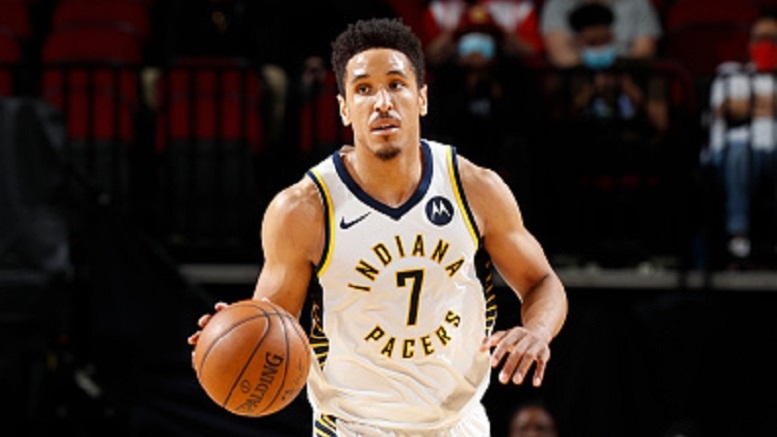
Malcolm Brogdon | Getty images
The Nuggets recently acquired the No. 30 selection and the deal unlocks more trade possibilities for Denver. In this scenario, the club packages Barton, Morris, and the selection to acquire Brogdon, who would nicely complement the franchise’s big-4.
For the Pacers, it gives them more assets as they retool in the post-Domantas Sabonis era (and Barton and Morris could certainly be headed elsewhere in this scenario). With the No. 30 pick, Indiana takes Kansas shooting guard Christian Braun to pair with Keegan Murray.
